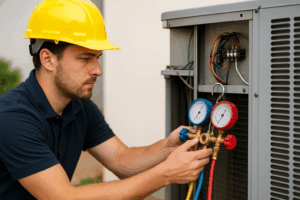What Does HVAC Stand For?
HVAC stands for:
-
Heating – Systems like furnaces or heat pumps that raise indoor temperatures during cold seasons.
-
Ventilation – Circulation of fresh air and removal of stale or polluted air to ensure indoor air quality.
-
Air Conditioning – Cooling systems that reduce temperature and control humidity during hot months.
Together, these components create a balanced indoor climate and contribute to health, safety, and energy efficiency.
How HVAC Systems Work
Modern HVAC systems use a combination of mechanical components and smart technology to control indoor environments. Here’s how it works:
H2: Heating
Furnaces and heat pumps generate warmth. Furnaces typically burn fuel (gas or oil), while heat pumps transfer heat from the outside air—even in winter.
H2: Ventilation
Ventilation may be natural (through windows or vents) or mechanical (via fans and ducts). Good ventilation removes allergens, odors, and pollutants.
H2: Air Conditioning
Air conditioners or heat pumps absorb heat from indoors and release it outside. They also remove moisture, which helps prevent mold and improve comfort.
Why HVAC Maintenance Matters
Just like a car, an HVAC system needs regular checkups. Routine maintenance can:
-
Extend system lifespan
-
Improve energy efficiency
-
Reduce utility bills
-
Enhance indoor air quality
-
Prevent costly breakdowns
Tip: Change air filters every 1–3 months and schedule professional servicing twice a year—ideally in spring and fall.
Energy Efficiency and HVAC
With rising energy costs and climate concerns, energy-efficient HVAC systems are more important than ever. Look for systems with an ENERGY STAR® rating, programmable thermostats, and variable-speed motors to reduce waste and maximize comfort.
According to the U.S. Department of Energy, heating and cooling account for nearly 50% of household energy use. An upgraded HVAC system can cut that number significantly.
Choosing the Right HVAC System
Selecting the right HVAC system depends on:
-
Climate: Heat pumps are ideal for mild winters, while furnaces work better in colder areas.
-
Home size: Systems must be properly sized for efficiency.
-
Budget and energy goals: High-efficiency units cost more upfront but save money long-term.
If you’re unsure, consult a certified HVAC technician for a proper load calculation and system recommendation.
Final Thoughts
HVAC systems do more than keep you comfortable—they play a key role in energy use, air quality, and long-term home value. Whether you’re installing a new system or maintaining an old one, understanding how HVAC works can help you make smarter choices.

